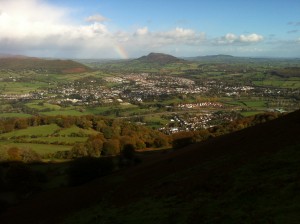Dominating the reclaimed marshlands of South Wales, Twm Barlwm stands as a barrier against potential invaders. I grew up below that mountain, in Newport, and every Good Friday a group of friends would undertake a strange pilgrimage to the top, an Iron Age hillfort, with its dome like construction at the summit. We used to call it the twmp, or the pimple, but from a distance its not difficult to see the mountain as a reclining woman. The pinnacle of Twm Barlwm is more like a nipple.
In The Silbury Treasure Michael Danes maintains that the Avebury stone circle in Wiltshire, and neighbouring Silbury Hill, the largest man made mound in Europe, is a Neolithic monument to procreation: the hill is a womb, the site, according to Dames, depicts a woman giving birth.
Neolithic peoples were the first farmers, and were well aware of the cycles of the seasons. They sowed and they reaped, and the invention of agriculture gave rise to settlements of much greater complexity than those that preceded them.
Perhaps Twm Barlwm is a similar construction, on a gargantuan scale. You can see the mountain from across the channel, in Bristol. The Romans built a fort and amphitheatre at Caerleon, just a few miles to the south of Twm Barlwm. I’ve often wondered if it was a base to lay siege to the mountain, Twm Barlwm, Tump Bellum, hill of war.
I left Wales to go to art school in London. There I discovered a tiny subculture of writers, poets and musicians who were admirers of the late nineteenth century Welsh mystic and author Arthur Machen. Machen grew up in Newport, but his writing life did not begin until he moved to that same suburb I found myself, Acton.
His London Adventure is my favourite book of his, but here I want to concentrate on The Hill of Dreams, which begins with this wonderful sentence:
‘There was a glow in the sky as if great furnace doors were opened.’
The Hill of Dreams is Machen’s fantasy of his childhood, and the hill is, of course, Twm Barlwm. It fictionalises Machen’s boyhood, much like my own, and his departure to London, where he attempts to make a living as a writer.
What pervades his books is a sense of the uncanny, of a belief that something more lies behind reality. I read his books at a time when I was struggling to move forward. On the evening I moved into a new room in a shared flat, it was a bitter winter, the heating failed, the pipes froze, as I was attempting to finish my first novel, a strong wind burst the window in my room, and when I reached down for my unpacked bag to find a jumper, I discovered the flat’s cat had pissed in it.
The cat’s owner had named it Crowley after the occulist, Aleister Crowley. Crowley (the man, not the cat) was an admirer of Machen, but the admiration was far from mutual. Aleister Crowley, I imagine, was the sort of man who would urinate in your bag and find it funny. For weeks after I smelt of cat piss. It felt like Crowley’s curse.
That first book was never published, but I did get a few encouraging responses form publishers.
Returning to Wales one spring, I decided to look for Machen’s childhood home, a rectory in Usk. I went with a couple of friends. It rained all day, and we got soaked. It was April 1986. A few days before the Chernobyl reactor in Ukraine exploded, nuclear radiation rained down over Wales, a ban was placed on sheep and cattle movement that wasn’t lifted for four years. Again, I had been pissed on. But this time it was serious piss.
During those difficult years, the struggle to make my way in the big city, Machen’s books brought me great solace. His trails were my trials, and his victories, I hoped, would soon be mine.
Unlike Machen, I returned to Wales, and to the hills: the Brecon Beacons, the Black Mountains. I find great comfort in their vastness and beauty. Those early years of living under the spell of a mountain still permeate my every waking moment. From Twm Barlwm to Pen y Fan, the mountains of Wales are all hills of dreams.
